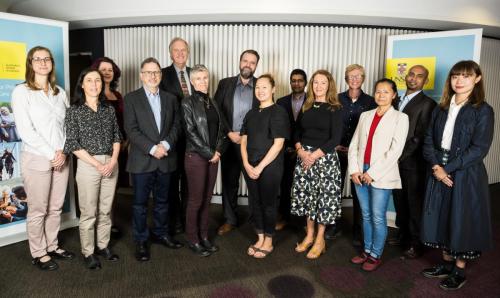Prevention and Management of Long Term Conditions

Description and Aims
This stream is a response to the challenge of long-term conditions to health and health care services. These conditions include diabetes, cardiovascular disease, asthma and chronic obstructive lung disease, cancer and mental illness. They commonly occur as multi-morbidities. The aim is conduct research in the community which informs improvement in health care and programs which aim to prevent and manage these conditions.
Key Current Research Areas
Prevention
The program focuses on improving interventions to address the behavioural risk factors (especially Smoking, Nutrition, Alcohol and Physical activity) as well as physiological risk factors such as obesity and cardiovascular risk in primary health care. This uses the 5As framework (ask/assess, advise, agree and assist, arrange), approaches tailored to health literacy levels and use of wearable technology and social media.
Management
This program focuses on a patient centred approach based on the Chronic Care model and includes teamwork, information and communication systems (including e-health), self-management support and community resources. This is the focus of work on diabetes, cardiovascular disease, asthma, COPD, cancer, mental illness and multi-morbidity.
Key Partners
This research is conducted in partnership with primary health networks and local health districts along with other groups including Aboriginal Health organisations.
Stream lead
Mark Harris leads the stream.
Completed
Projects
Evaluation of Moving On: a self management program for people with a chronic illness
Support for Chronic Disease Self Management (CDSM) is a recognized part of chronic disease management. Arthritis NSW developed Moving On and commissioned CPHCE to evaluate the program.
Evaluation of multidisciplinary care plans for patients with type 2 diabetes
This study aimed to examine the effect of multidisciplinary care plans on provision and outcome of care plans with type 2 diabetes.
Evaluation of the "Literacy Gap in Health Among Target Population (LIGHT)" in Inner Sydney General Practices
Health literacy may be understood from two perspectives; as a health asset which patients need to develop in order to have an active role in their health care, or as a risk factor for health professionals to manage through more effective communication and methods such as ‘teach-back’. Health literacy may be defined as ‘The degree to which individuals have the capacity to obtain, process and understand basic health information and services needed to make appropriate health decisions’. Health literacy has been directly and indirectly linked to poorer health outcomes, whether this may be from poor understanding of health information (verbal and written), or from the relationship between low health literacy and other socio-economic determinants of health. Low health literacy is associated with less engagement in healthy lifestyles and with poorer knowledge about chronic disease and limited self-management skills.The 2006 Adult Literacy and Life Skills Survey found that 60% of Australians had low health literacy. This percentage was found to be higher among those from low socioeconomic backgrounds. The LIGHT project specifically targets patients with low health literacy, which often correlates with social disadvantage. Through improving health literacy levels, patients will be able to make more informed lifestyle choices, and will have the tools to better access the health services which they require.
Evaluation of the acceptability and clinical utility of the Arabic language Mindfulness CD
This project consisted of the evaluation of an Arabic language Mindfulness CD to determine if this intervention was acceptable and useful as a self-management resource for Arabic speaking adults residing in the St George area.
Evaluation of the asthma 3+ visit plan
This study looked at the uptake of the Asthma 3+ Visit Plan from consumers as well from care providers' perspectives.


